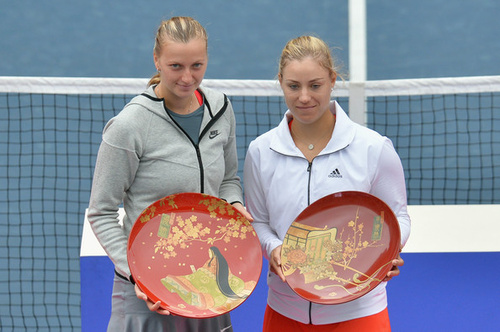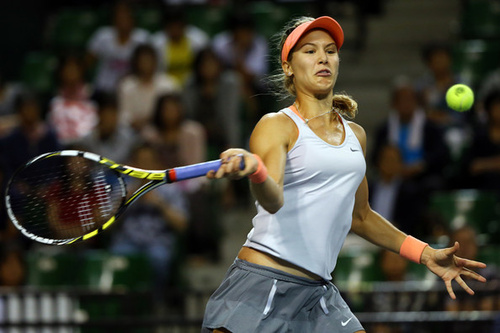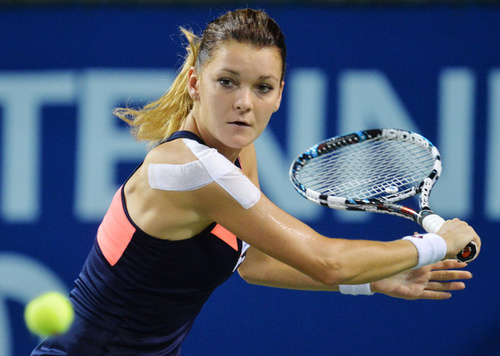Don't miss any stories → Follow Tennis View
FollowStuds and Duds: Reviewing Tokyo, Bangkok, and Kuala Lumpur
The latest edition of Studs and Duds focuses on the WTA Premier Five tournament in Tokyo, with some detours to smaller ATP events in Bangkok and Kuala Lumpur.

Studs:
WTA lefties: Dominated by right-handers in recent years, women’s tennis had seen its top two lefties struggle for much of 2013. They had combined for one total title in the last 12 months, but champion Petra Kvitova and runner-up Angelique Kerber managed to get back on track in Tokyo as they look to set the stage for a stronger campaign in 2014. Rallying from a one-set deficit in her semifinal, Kvitova complemented her firepower with the required dollop of discipline. For her part, Kerber scored the more impressive wins of the two finalists by upsetting top-eight opponents Agnieszka Radwanska and Caroline Wozniacki. The final unfolded much as one would expect from two flaky, unpredictable competitors. Kvitova swept through the first set but tossed away the second before racing ahead in the third and hanging on tight as Kerber threatened to charge all the way back.
Nor should the exploits of Kvitova’s compatriot, Lucie Safarova, go unnoticed. Having won a small title in Quebec City two weeks before, Safarova extended her strong fall with a quarterfinal run in Tokyo. She knocked off two seeds, Roberta Vinci and former US Open champion Samantha Stosur, en route to the longest WTA-level winning streak of her career.
Venus Williams: Vindication came for Venus this week in Tokyo, her first tournament after a painful loss in a third-set tiebreak at the US Open. While she would lose another third-set tiebreak this week, in the semifinals, her movement and forecourt play looked crisper than they had for most of the season. Venus kept some of the younger generation’s hottest stars at bay, halting Simona Halep and Eugenie Bouchard in three-setters that showcased her undimmed resolve. She also became the first woman in 17 months to defeat Victoria Azarenka before the final on an outdoor hard court, albeit with an asterisk (see below).
Top four Bangkok seeds: All of them reached their appointed destinations in the semifinals, not without some wobbles en route. The absence of upsets produced the strongest possible lineups for the weekend, pitting Tomas Berdych against Gilles Simon and Milos Raonic against Richard Gasquet. In the latter match, the indoor hard court allowed the Canadian to reverse an epic loss to the Frenchman at the US Open. Raonic would build on that victory to win his second title of the year and just the second of his career outside San Jose, where he has won three.
In the other semifinal, another suspenseful three-setter, Berdych returned to the top five with a gritty effort against an opponent in Simon who had won a title the week before. The Czech star’s route to the World Tour Finals now looks virtually assured, while Raonic bolstered his slim hopes by winning the title.
Kuala Lumpur finalists: For the second straight week, the unseeded Joao Sousa reached an ATP semifinal. Having upset Grigor Dimitrov at the US Open, Sousa followed a strong week in St. Petersburg with upsets of world No. 4 David Ferrer and Jurgen Melzer in Kuala Lumpur. He could not have asked for a more auspicious opponent in the first final of his career, for Julien Benneteau brought an 0-8 finals record into the weekend. It would stand at 0-9 when Sousa rallied from losing the first set to win his maiden title. Still, Benneteau had knocked off US Open semifinalist Stanislas Wawrinka to reach this stage, recalling his upset of Roger Federer on an indoor court in February. The Frenchman enjoys indoor hard courts more than most surfaces and may become a dark horse in the weeks ahead.

Eugenie Bouchard: Canadian tennis has burst onto the international scene this year. While the Davis Cup team contested its first World Group semifinal, Milos Raonic reached his debut Masters 1000 final, and Vasek Pospisil showed flashes of future promise, not all of the headlines have belonged to the men. Quebec rising star Eugenie Bouchard built on a semifinal at her home tournament to reach her first Premier Five quarterfinal in Tokyo. Before cruising past former No. 1 Jelena Jankovic, Bouchard scored victories in potential rivalries of the future against Monica Puig and Sloane Stephens.
Madison Keys: Some concern lingered over a shoulder injury that this 18-year-old suffered during the US Open Series. Keys relies on her shoulder for the explosive serve that forms the foundation of her game, so a solid week in Tokyo reassured fans of her health. She scored consecutive victories on an outdoor hard court for the first time since the Australian Open, including a long three-set battle with Carla Suarez Navarro that testified to improved fitness.
Japanese women: The trio of Ayumi Morita, Misaki Doi, and Kimiko Date-Krumm each won a match in their nation’s most significant tournament. Morita and Doi even upset higher-ranked opponents in Laura Robson and Varvara Lepchenko, respectively. With former top-10 star Ai Sugiyama long gone, Japanese women’s tennis needs all of the positive energy that it can get.
Novak Djokovic: He completed his 100th week at world No. 1, divided between two segments there. Djokovic will tie Andre Agassi for eighth all-time in total weeks at No. 1 next week, after which he could lose the top spot to Rafael Nadal—who is seventh on that list. He also announced his engagement to long-time girlfriend Jelena Ristic, an even greater cause for celebration.
Duds:
Top two Tokyo seeds: World No. 2 Victoria Azarenka lost before the final on a hard court for the first time this year. A faded but still dangerous Venus Williams pounced on a clearly ailing Azarenka, who fell to 0-3 against the seven-time major champion. Too ill even to unleash her trademark shrieks, the Australian Open champion will hope to rebound for a title defense in Beijing next week.

Having won the Seoul title last week, second seed Agnieszka Radwanska looked to win tournaments in consecutive weeks for the second time this year. Her quest fell well short in the quarterfinals despite having reached the Tokyo final in each of the last two years. Radwanska has not returned to that round at any of the Tour’s elite events in 2013.
Spaniards in Kuala Lumpur: Here are the opponents who have defeated world No. 4 David Ferrer at his last four non-majors: Xavier Malisse, Alex Bogomolov, Dmitry Tursunov, Joao Sousa. Ferrer has shrunk to a shadow of himself since returning from an ankle injury at the season’s midpoint. Although these results do not yet justify theories of a long-term decline, Ferrer has started to lose his reputation of regularly dominating players outside the elite.
After winning four matches at the Australian Open, Nicolas Almagro has won just three total matches at all hard-court tournaments since then. His quarterfinal loss to Ferrer at the year’s first major, in which he won the first two sets and served for the match three times, set the tone for one of his most disappointing seasons. As the third seed, Almagro fell in his Kuala Lumpur opener.
Italian women: They held two top-eight seeds in the Tokyo singles draw, but neither Sara Errani nor Roberta Vinci won a match (or even a set) last week. The fast surface in the Ariake Coliseum probably did not suit playing styles more reliant on variety than power. Fatigue from a long doubles schedule for the WTA’s best duo also may have dulled their fall form.
Ryan Harrison: At his best on home soil, the young American has posted a 5-11 record in main draws outside the United States over the last 12 months. Harrison did not reward Kuala Lumpur organizers for handing him a wildcard, offering little resistance in the first round to world No. 77 Joao Sousa. He had more double faults (seven) than games won (five).










